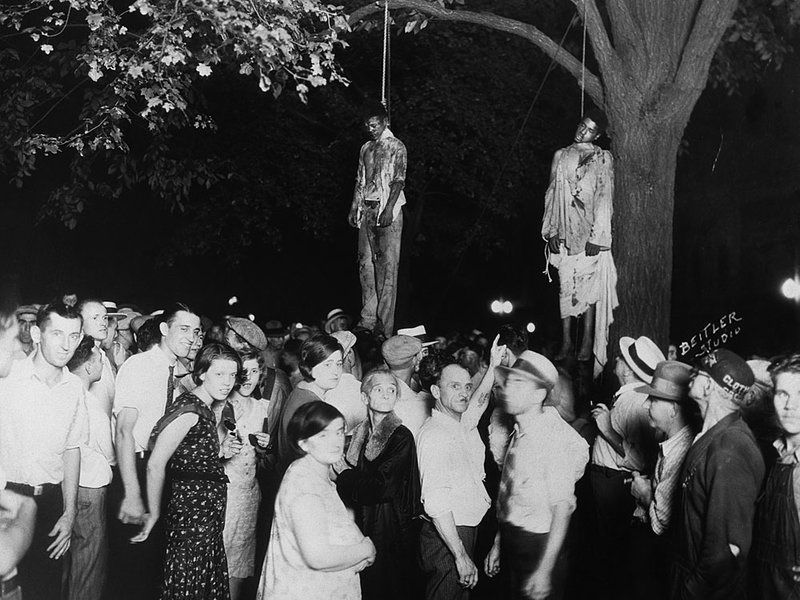This is a part of the Classic Obsidian Collection! The Classic Obsidian Collection is a group of articles that were some of the first pieces that I wrote when starting the site. These articles got lost in some website shuffling and I’m excited to polish them up a little bit and share them again. I’ll be writing follow ups/part 2, or just be reposting this content. Enjoy some Classic Obsidian Tea!
Strange Fruit and Feelings
Recently at a workshop I slowed class down and had us stop and think as we listen to the well-known song, Strange Fruit.The class was about listening to lyrics and the importance of understanding story. As the song stopped, I found myself struggling to find words to describe the emotion that I was overwhelmed with. I looked out until crowd of faces, that mostly didn’t look like mine, and I saw a vast range of emotions that I didn’t quite understand. So I asked my students, “How does the song make you feel?” Some said the song made them feel sad. Others it made them angry. What surprised me was the fact that many of my students simply felt nothing at all.
“It was too far removed from their everyday life. so really hard to get the idea of lynching as anything more than just an idea”
Honestly, I was shocked and more than a little confused. Perhaps it was my upbringing of reading African American history books and constantly being told of the horrors of the world against our race. Or, it was all the war movies I watched, about the horrible ways that Black military men have been treated. Perhaps, it had been all the historical movies about some Black people doing something particularly hard because there were people against the idea, and watching all of their trials as they strive to, Just be. The song made me sad, it made me fearful, it made me sick in a way that the beautiful voice of Nina Simone added to the haunting call. I felt nauseous, and teary-eyed, and just a bit shaky. And to look out of a room of people that I was teaching and for them not to feel this, was very disorienting.
Starting a hard conversation

I decided to tell them about something I’d happen across in my recent research on the topic relating to Blues but not necessarily about Blues. It turns out, there’s a lot of information on African-American history in the Library of Congress some of which you can access online. I spent a full day looking through archives from the 1800s about the common newspaper clippings from the time period. As much as our accomplishments were talked about there was a theme that continued through the Ages. Lynching. At the end of each section there would be a stark fact and it would go something like this. “Lynchings. One hundred and sixty-one Black Americans are known to have been lynched in 1892.”
It was stark, cold and factual set as the last thing to account for after every year of notable things. For me, the worst part of the sentence being at the end of every year. Worse the fact that some years this was the only notable thing to happened, was that these are two people that were known to have been lynched. It doesn’t account for all the people that were covered up, died in secret, and died in other ways. The longer I read in this archive the more sick I felt to my stomach.
We have done so much as a race, and we also faced so much senseless death. It was horrific and yet I still felt like this didn’t quite convey the depth of my feelings about subject. After a while, of us discussing things, I realized that they genuinely might not understand that this isn’t something that actually stop happening. Some people compared it to police brutality, and I could see that the room was torn about that. So I chose to mention something personal.
Making It Personal

When I was a child I specifically remember being told a story that had actually just happened. Hearing the story has definitely colored in my life in some ways. When I was growing up in the 90s, they were the story of a man in Texas that was just been murdered.
I won’t go into details but the story is from ’98. That was not that long ago. I remembered the horror I felt. That someone that looks just like me was tortured and killed for no reason. The fear, but there were some people in this world that would kill me just for the way I look. My step-father told me to be wary of white people. If you’re white and reading this, you may feel slightly offended as people so often do when I tell them about that. You’ve never had to live with that fear. I’m not saying that my stepfather is a great man, he isn’t. As I get older I can’t help but see the truth behind some of his words.
To remain safe, in a culture that doesn’t care about you, one needs to keep their guard up and be wary of those that might hurt you.
And I told this to my class of mostly white students. That I recognized that to them this something that exists only in the past. But to me, lynchings is a part of our culture and our legacy. It is something that deeply affects us. I think a lot of us live with the subconscious here of it one day happening to us or someone we love. This is not something so far removed from current society.
Final Thoughts
I think it’s important to understand the impact of lynching on the Black culture. This includes our understanding blues music but also the bigger culture found within the United States. if you find this topic interesting I encourage you to check out this site. It’s an amazing site and project focused on the legacy of lynching. it is not an easy read, nor listen to. but I also don’t think it’s something we should shy away from and act like doesn’t exist or still impact us. I hope everyone who’s read this far checks it out.
This is part one of a two part series on lynching. Part two will highlight how lynching is relevant today, so be on the look out for that!


